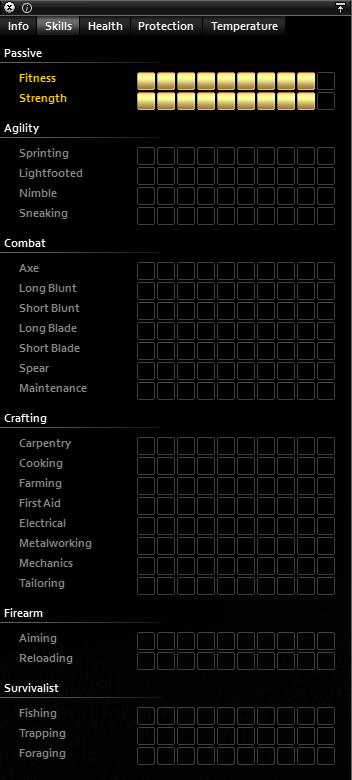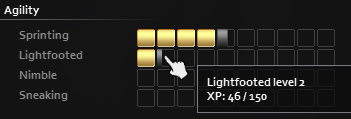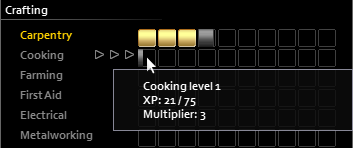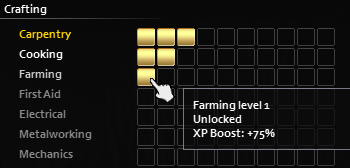Skills
Skills are abilities the player can advance in over time, with their proficiency at that skill quantified by it's skill level.
Overview
Each skills level can be increased by gaining a sufficient amount of 'experience points (also referred to as 'experience' or XP) in that skill. XP can be gained by completing specific tasks.
Skills are grouped into categories. There are currently six skill categories: passive, agility, combat, crafting, firearm, and survivalist. Each category contains multiple skills.
Status
The player's current skill levels are found by opening the health panel (click the heart symbol at the top-left of the screen) and selecting the skills tab, or by pressing L.
Advancement mechanics
Experience points and skill points
As the player performs tasks they gain experience points that count towards the skill used. Skills level up and become more effective when a character's experience points reach predefined levels, with successive levels requiring greater increases in experience. The experience points a character requires to gain another level are shown when hovering over a skill:
The experience points required to level up skills in build 41.78.16 are:
| Level | 1 | 2 | 3 | 4 | 5 | 6 | 7 | 8 | 9 | 10 |
|---|---|---|---|---|---|---|---|---|---|---|
| Passive skill | 1500 | 3000 | 6000 | 9000 | 18000 | 30000 | 60000 | 90000 | 120000 | 150000 |
| Regular skill | 75 | 150 | 300 | 750 | 1500 | 3000 | 4500 | 6000 | 7500 | 9000 |
The skills in the passive category (strength and fitness) are unique in that they require significantly more experience points to gain levels in than any other skill. For example, advancing to level 1 in strength requires 1,500 experience points, whereas advancing carpentry to level 1 would only require 75 experience points.
The figures shown here are not cumulative. For example, improving 'regular skills' such as carpentry from level 3 to 4 would require 750 experience points, but raising carpentry from level 0 to level 4 would require the cumulative experience of reaching level 1, then level 2, then level 3, and finally level 4, which would add up to a total of 1,275 experience points.
Skill books
Skill books can be used to increase the rate at which the player trains a given skill. These books can be found throughout the world on bookshelves or in other containers. Books are only available for skills in the "crafting" and "survivalist" categories. Additionally, books only apply to specific levels of skill advancement, with a book for every two levels of skill, totaling 5 volumes of books for each skill. For example, reading Carpentry Vol. 1 will only increase experience points gained until the player reaches level 2. Books can only be read if they apply to a character's current skill level; for example, Carpentry Vol. 2 can only be read once the player reaches level 2 carpentry.
Reading a book multiplies the rate at which the player gains experience points in the associated skill, and as a result significantly reduces the amount of time and effort required to level up skills. The experience multiplier increases in steps as the player reads the skill book, with the multiplier increasing for each 10% of the book that the player reads. For each 10% of the book finished, the multiplier will become equal to the appropriate percentage of the max multiplier for the book. If the resulting multiplier is below 1, it will be ignored; for example, 10% of a Vol. 1 book would result in a 0.3x multiplier, but the player will still receive 1x experience points.
The presence of a multiplier on a given skill is indicated by animated arrows in the skill tab. Hovering the cursor over a skill level reveals the current multiplier. Below, the player has a multiplier of 3x on their cooking skill.
| Level | 1 | 2 | 3 | 4 | 5 | 6 | 7 | 8 | 9 | 10 |
|---|---|---|---|---|---|---|---|---|---|---|
| Actual XP required | 75 | 150 | 300 | 750 | 1500 | 3000 | 4500 | 6000 | 7500 | 9000 |
| Total XP required | 75 | 225 | 525 | 1275 | 2775 | 5775 | 10275 | 16275 | 23775 | 32775 |
| Skill book multiplier | 3 | 3 | 5 | 5 | 8 | 8 | 12 | 12 | 16 | 16 |
| Effective XP required | 25 | 50 | 60 | 150 | 187.5 | 375 | 375 | 500 | 468.75 | 562.5 |
| Effective total XP required | 25 | 75 | 135 | 285 | 472.5 | 847.5 | 1222.5 | 1722.5 | 2191.25 | 2753.75 |
Starting skill levels
The occupation and traits chosen during character creation determine a character's initial skill levels. The player's initial choices during character creation (and the skill levels they confer) are very important, and should be given careful consideration since skills a character begins with bonus levels in will receive a permanent 'XP boost' (a misnomer, as it overwrites the character's base rate of experience gain to the new value, rather than adding to or multiplying it). This bonus is dependent on the level a character begins with in that skill, and the experience point boost the character ends up with during character creation reflects permanently in the color of the skill's name in the skills menu. The image below shows each color a skill name can be, with yellow/gold, white, light gray, and dark gray reflecting boosts of 125%, 100%, 75%, and 25% (default), respectively.
Note that since characters normally start with strength and fitness of 5, the character will by default begin with a 125% experience point bonus in these skills, unless the player's occupation and trait choices lower either of these skills' starting levels to less than 3.
The base experience multipliers ('XP boosts') gained with different starting levels are as follows:
| Starting level | 0 | 1 | 2 | ≥3 |
|---|---|---|---|---|
| 'XP boost' | 25% | 75% | 100% | 125% |
| Relative experience gain | 100% | 300% | 400% | 500% |
However, in-game data reveals actual experience gain corresponds to the following table:
| Starting level | 0 | 1 | 2 | 3 |
|---|---|---|---|---|
| 'XP boost' | 25% | 100% | 133.33% | 166.66% |
| Relative experience gain | 100% | 400% | 533% | 666% |
Exceptions:
- The sprinting skill has experience gains set to 100%, 125%, 133%, and 166%, respectively.
- The aiming and reloading skills suffer an overall multiplier of 0.37037 upon a character reaching level 5 in the respective skill.
List of skills
Passives
| Name | Effect |
|---|---|
| Strength | Strength affects several of a character's physical abilities, including:
|
| Fitness | Fitness affects several of the player's physical abilities, including:
|
Agility
| Name | Effect |
|---|---|
| Sprinting | The sprinting skill affects how fast a character runs and sprints, including running while sneaking.
Experience is gained in random intervals while running (hold ⇧ Shift) and sprinting (press L. ALT). Note that if the player is too overexerted or overburdened they may simply "power-walk" instead, but they can still gain sprinting experience while doing so. Zombies do not need to be nearby for the player to gain sprinting experience. The speed increase is added (not multiplied) to movement speed, so it may not stack intuitively with other effects. |
| Lightfooted | The lightfooted skill affects how loud a character's footsteps are, and as a result, how far away zombies can hear those footsteps from. All movement types are affected, including walking, running, etc., and the noise reduction from the lightfooted skill stacks with the noise reduction from the nimble skill. The effects of lightfooted are particularly evident with sprinting; at level 0 in the lightfooted skill, a sprinting character's footsteps will alert zombies from several tiles away, even when behind those zombies. However, at level 10 in the lightfooted skill, a character will produce so little noise while sprinting that even sprinting within a few tiles behind a zombie may not alert it. |
| Nimble | The nimble skill affects how fast a character moves while in 'combat stance', and how loud their footsteps are. The footstep loudness reduction of the nimble skill affects all movement types, not just while in combat stance, and stacks with the loudness reduction from the lightfooted skill. Much like the lightfooted skill, the footstep noise reduction of the nimble skill is particularly noticeable when sprinting behind zombies.
Experience is gained in random intervals by walking in combat stance (Holding L. CTRL or RMB). Zombies do not need to be nearby for the player to gain nimble experience, but the player will not gain any experience points if they aren't moving anywhere. For example, continuously walking into a corner will not grant any nimble experience because the character's position isn't actually changing as they walk. |
| Sneaking | The sneaking skill affects how loud a character's footsteps are when sneaking, and how likely zombies are to spot them.
Experience is gained by sneaking (pressing C) near zombies while undetected. Walking/running while sneaking has a default 20% sound radius multiplier, and a 40% detection chance multiplier. For example, at level 0 in the sneaking skill, the base 20% sneak sound radius multiplier will be multiplied by the level 0 sneaking skill multiplier of 120%, leading to an effective footstep sound radius of 24% while sneaking. (20% * 120% = 24%) |
Combat
| Name | Effect |
|---|---|
| Axe (skill) | The axe skill influences attack speed, damage done, critical chance, and the chance of the character automatically pushing zombies away when grabbed (front grabs) while using axes, such as hand axes and wood axes. |
| Long Blunt | The long blunt skill influences attack speed, damage done, critical chance, and the chance of the character automatically pushing zombies away when grabbed (front grabs) while using long blunt weapons, such as baseball bats and crowbars. |
| Short Blunt | The short blunt skill influences attack speed, damage done, critical chance, and the chance of the character automatically pushing zombies away when grabbed (front grabs) while using short blunt weapons, such as wrenches and nightsticks. |
| Long Blade | The long blade skill influences attack speed, damage done, critical chance, and the chance of the character automatically pushing zombies away when grabbed (front grabs) while using long blades, such as katanas and machetes. |
| Short Blade | The short blade skill influences attack speed, damage done, critical chance, and the chance of the character automatically pushing zombies away when grabbed (front grabs) while using short blades, such as kitchen knives and hunting knives. This skill also affects the chance of jaw stabs when using short blades that have a 'stabbing' attack type. |
| Spear | The spear skill influences attack speed, damage done, critical chance, and the chance of the character automatically pushing zombies away when grabbed (front grabs) while using spears. |
| Maintenance | The maintenance skill reduces the chance for a melee weapon to lose condition on each hit. For the firearms equivalent, see aiming. |
The effects of weapon skill levels are additive with changes coming from other sources such as moodles, strength, and fitness.
The critical chance from skills is added on top of the base critical chance of the weapon. The critical chance of any attack has a minimum of 10% and a maximum of 90%.
Whenever a zombie performs an attack, the player has a chance to block it. If an attack is blocked the damage is simply negated. When a zombie's attack successfully hits the player, the attack is checked against the player's resistances through a separate calculation which uses the player's injury chance.
All weapon skills other than the axe skill are reduced by one when used in the following calculations, such that level 1 is equivalent to level 0 and level 10's stat boosts are unachievable. When using this table with weapon skills other than the axe skill, subtract 1 from the player's weapon skill level on the table.
| Proficiency level | 0 | 1 | 2 | 3 | 4 | 5 | 6 | 7 | 8 | 9 | 10 |
|---|---|---|---|---|---|---|---|---|---|---|---|
| Damage | 30% | 40% | 50% | 60% | 70% | 80% | 90% | 100% | 110% | 120% | 130% |
| Crit chance | 0% | 3% | 6% | 9% | 12% | 15% | 18% | 21% | 24% | 27% | 30% |
| Attack speed | 0% | 3% | 6% | 9% | 12% | 15% | 18% | 21% | 24% | 27% | 30% |
| Block chance | 0% | 3% | 6% | 9% | 12% | 15% | 18% | 21% | 24% | 27% | 30% |
| Injury chance | -5% | -2% | 0% | 1% | 2% | 3% | 4% | 5% | 5% | 6% | 7% |
Crafting
| Name | Effect |
|---|---|
| Carpentry | The carpentry skill allows the player to construct wooden structures and furniture, and also affects the chance of repairing items and the durability restored by doing so, the health and construction speed of wooden barricades, the amount of noise made while building, and the health and quality of constructed buildings and structures. |
| Cooking | The cooking skill allows the player to create more nutritious and filling food, and also affects the player's ability to detect poison. In addition, raising the cooking skill to level 7 allows the player to safely use rotten ingredients in certain food types, such as in soups and stews. |
| Farming | The farming skill affects the player's ability to check the status and health of crops. The information available to the player when checking their crops increases with each level. |
| First Aid | The first aid skill affects the player's ability to evaluate the severity of injuries, as well as the speed at which the player performs medical actions. It also affects the effectiveness of the poultices and splints that the player applies, as well as the lifespan of any bandages they apply. |
| Electrical | The electrical skill allows the player to perform a wide range of electrical-related actions as their skill level in electrical increases. Some examples include the ability to hot-wire vehicles at level 1 electrical (though level 2 in mechanics is required as well), convert lamps to run on batteries at level 5 electrical, and crafting various devices using the materials the player receives through disassembling electrical items they find. Higher electrical levels also improve the efficiency or success chance of the player's electrical-related actions, including the effectiveness of generator repairs and the success rate of hot-wiring attempts, as well reducing the likelihood of triggering car alarms when hot-wiring. |
| Metalworking | The metalworking skill allows the player to craft metal structures and items, as well as repair some metal objects such as vehicle parts. Crafted metal structures are generally stronger than their wooden equivalent, and the player's metalworking skill level when crafting those structures will increase the durability of those structures. |
| Mechanics | The mechanics skill affects the player's ability to work on vehicles, including the success rate of installing or removing components and how effective repairs are. The player also gains the ability to hot-wire vehicles at mechanics level 2, provided they also have at least level 1 in electrical. |
| Tailoring | The tailoring skill allows the player to apply fabric patches to clothes, increasing the defense of those clothes. The player applies patches using fabric they receive from ripping up clothes, with different types of clothes providing different fabric when ripped up. The amount of defense that a patch provides is determined by the player's skill level in tailoring, as well as the type of fabric they use to create the patch. At tailoring level 8, the player gains the ability to completely repair holes in clothes, restoring the clothes' original defense and appearance. |
Firearm
| Name | Effect |
|---|---|
| Aiming | The aiming skill determines five key stats for firearms: accuracy, precision, range, firing angle, and aiming time. Aiming experience is gained whenever the player successfully lands a shot on an enemy with a firearm. |
| Reloading | The reloading skill determines how long it takes the player to perform the following reloading-related tasks: |
Survivalist
| Name | Effect |
|---|---|
| Fishing | The fishing skill affects how long it takes the player to catch a fish, the chance of breaking the fishing line, the chance of the fish escaping, the chance of losing bait or tackle, and finally the size of the fish caught.
Fishing experience is gained by casting a fishing line into the water or using a spear to fish. The player will gain fishing experience regardless of the outcome of the catch. Larger fish will provide more experience per catch. |
| Trapping | The trapping skill affects the player's chances of successfully catching animals in a trap, and also determines what traps they are able to craft.
Trapping experience is gained by retrieving the animals that get caught in the player's traps. |
| Foraging | The foraging skill affects search mode; higher levels increase search mode's radius, item detection speed, chances of finding items, as well as what items can be found while foraging.
Foraging experience is gained whenever the player finds items in search mode, and additional experience is gained by choosing to either collect or reject the found items. Both collecting and rejecting items reward the same additional experience. |
Gallery
Skills in old game versions back from 2012






